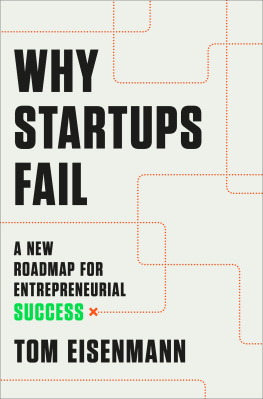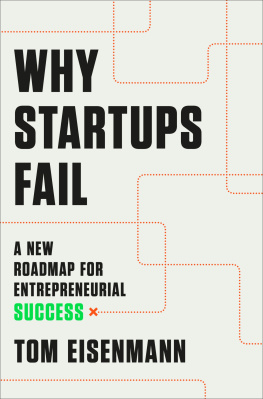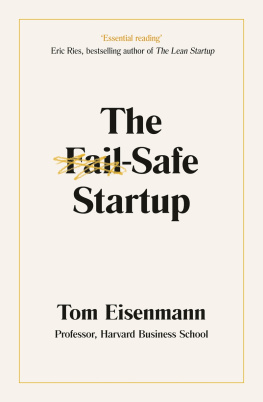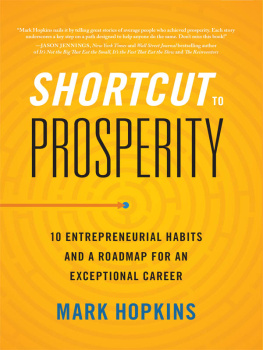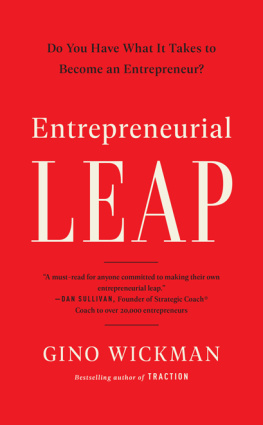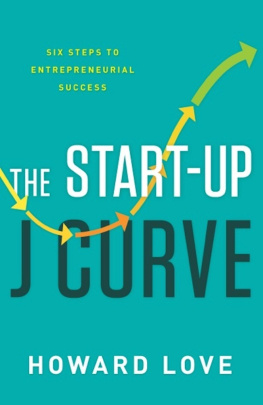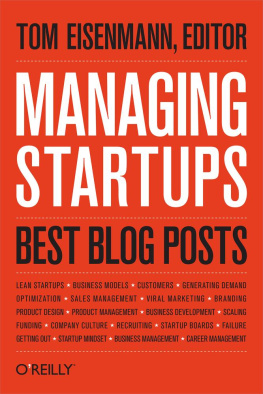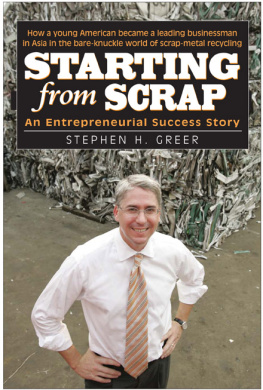Tom Eisenmann - A New Roadmap for Entrepreneurial Success
Here you can read online Tom Eisenmann - A New Roadmap for Entrepreneurial Success full text of the book (entire story) in english for free. Download pdf and epub, get meaning, cover and reviews about this ebook. year: 2021, publisher: Crown, genre: Romance novel. Description of the work, (preface) as well as reviews are available. Best literature library LitArk.com created for fans of good reading and offers a wide selection of genres:
Romance novel
Science fiction
Adventure
Detective
Science
History
Home and family
Prose
Art
Politics
Computer
Non-fiction
Religion
Business
Children
Humor
Choose a favorite category and find really read worthwhile books. Enjoy immersion in the world of imagination, feel the emotions of the characters or learn something new for yourself, make an fascinating discovery.
- Book:A New Roadmap for Entrepreneurial Success
- Author:
- Publisher:Crown
- Genre:
- Year:2021
- Rating:4 / 5
- Favourites:Add to favourites
- Your mark:
- 80
- 1
- 2
- 3
- 4
- 5
A New Roadmap for Entrepreneurial Success: summary, description and annotation
We offer to read an annotation, description, summary or preface (depends on what the author of the book "A New Roadmap for Entrepreneurial Success" wrote himself). If you haven't found the necessary information about the book — write in the comments, we will try to find it.
A New Roadmap for Entrepreneurial Success — read online for free the complete book (whole text) full work
Below is the text of the book, divided by pages. System saving the place of the last page read, allows you to conveniently read the book "A New Roadmap for Entrepreneurial Success" online for free, without having to search again every time where you left off. Put a bookmark, and you can go to the page where you finished reading at any time.
Font size:
Interval:
Bookmark:
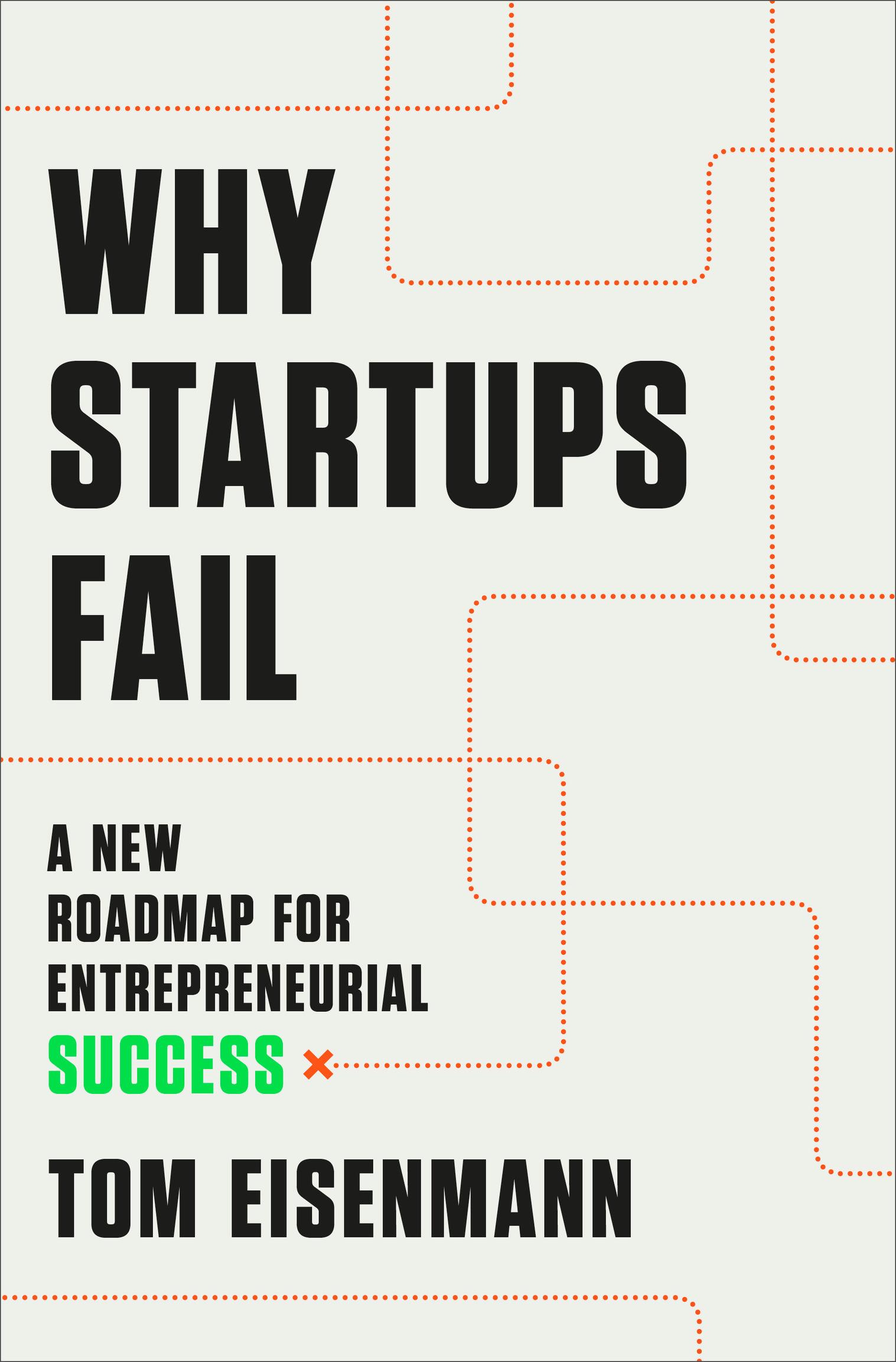
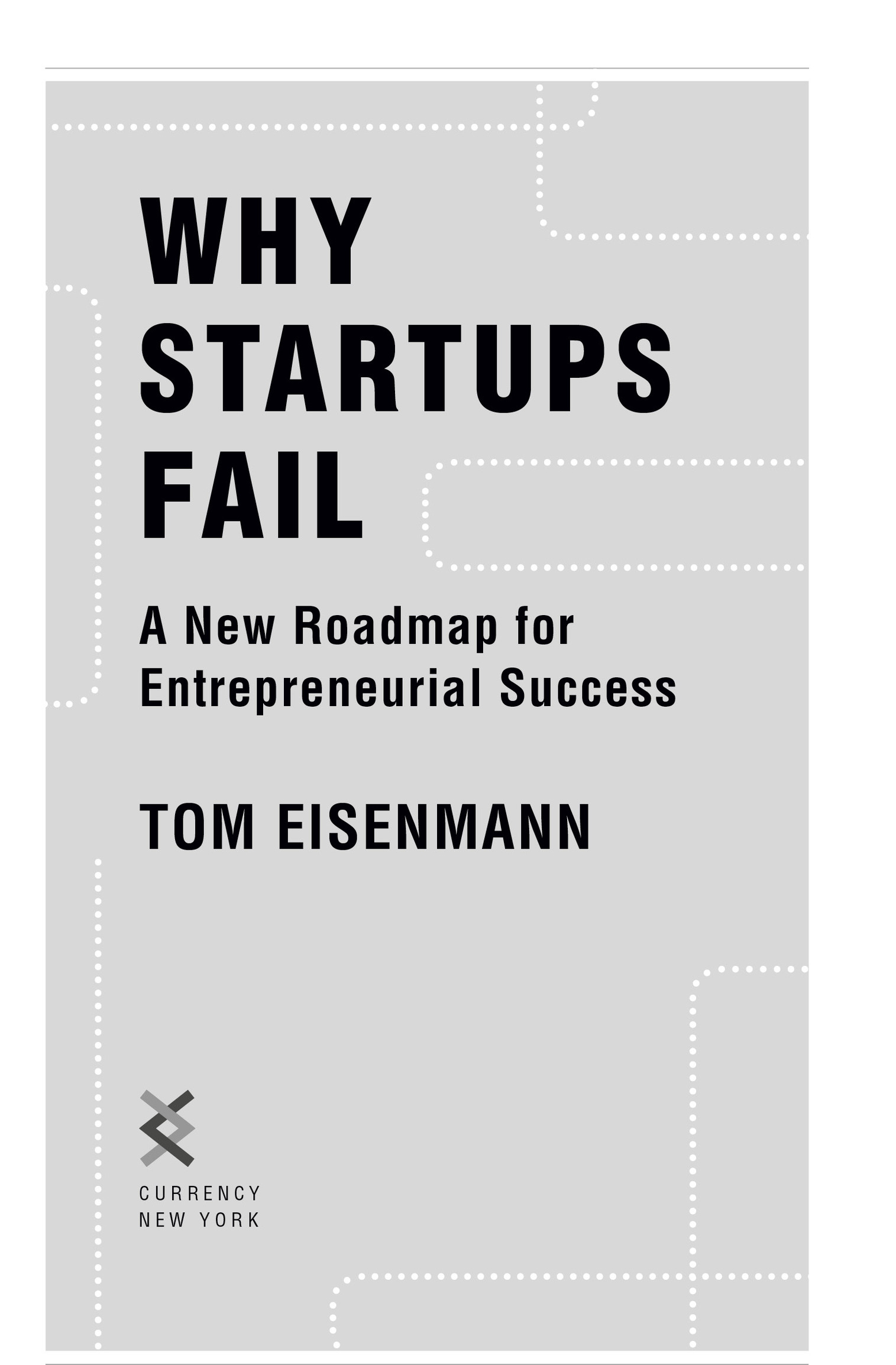
Copyright 2021 by Tom Eisenmann
All rights reserved.
Published in the United States by Currency, an imprint of Random House, a division of Penguin Random House LLC, New York.
Currency and its colophon are trademarks of Penguin Random House LLC.
Library of Congress Cataloging-in-Publication Data
Names: Eisenmann, Thomas R., author.
Title: Why startups fail / Tom Eisenmann.
Description: New York : Currency, [2020] | Includes bibliographical references and index.
Identifiers: LCCN 2020047464 (print) | LCCN 2020047465 (ebook) | ISBN 9780593137024 (hardcover ; alk. paper) | ISBN 9780593239391 (alk. paper) | ISBN 9780593137031 (ebook)
Subjects: LCSH: New business enterprises. | Business failures. | Success in business. | Entrepreneurship.
Classification: LCC HD62.5 .E446 2020 (print) | LCC HD62.5 (ebook) | DDC 658.1/1dc23
LC record available at https://lccn.loc.gov/2020047464
LC ebook record available at https://lccn.loc.gov/2020047465
Hardback ISBN9780593137024
International ISBN9780593239391
Ebook ISBN9780593137031
crownpublishing.com
Book design by Victoria Wong, adapted for ebook
Cover design: Christopher Brand
ep_prh_5.6.1_c0_r0
Why do the vast majority of startups fail? That question hit me with full force several years agowhen I realized that I couldnt answer it. In quick succession, I had witnessed the demise of two startups that I knew well, both founded by former students of mine. Youll meet these entrepreneurs and learn about their experiences later in the book. The first, Triangulate, had assembled a talented team to create and operate online dating sites. The second, Quincy, had come up with a terrific idea: to sell stylish, affordable, better-fitting work apparel for young professional women. Id encouraged my students to launch both of these ventures, and I was also an investor in Quincy. Yet, despite their strong promise, both of these startups failed. Why? In each instance, I could list many possible reasons, but I couldnt pinpoint the root cause.
This was unnerving: Here I was, an academic expert teaching some of the countrys brightest business minds how to give their future companies the best shot at success, yet I was a failure at explaining how they could avoid failure. And, since more than two-thirds of new ventures fail, that left a lot of explaining to do!
For the past twenty-four years, Ive been a professor at Harvard Business School, where Ive led The Entrepreneurial Manager, a required course for all of our MBAs. At HBS, Ive also drawn on my research, my experiences as an angel investor, and my work for startups as a board director to create fourteen electives on every aspect of launching new ventures. HBS is a startup factory: Our alumni have founded more than thirteen hundred venture capitalbacked startups since 2006. Weve seen our fair share of successes. Over the past ten years, nineteen HBS startups have achieved unicorn statusa valuation in excess of $1 billionincluding Stitch Fix, Cloudflare, Oscar Health, and Zynga. Many of the unicorns founders were my students; I provided guidance and feedback on their venture plansas Ive done with at least two thousand other HBS students and alumni.
At the same time, weve had plenty of failures. Most were promising ventures founded by bright, committed entrepreneurs. Many of these founders followed our playbook for startup success diligently and executed it flawlessly. They identified a gap in the market, devised a differentiated product to meet that need, and validated market demand using the best Lean Startup techniques. They chose a proven business model, sought out advisers, and hired employees with the experience their startup needed. By all accounts, these ventures should have succeeded. And yet
My inability to explain why these high-potential companies failed to live up to their promise cast doubt on whether the playbook I was teaching at HBS was as bulletproof as I thought. Was the advice Id given to countless founders unsound? And if I couldnt sufficiently explain the causes of startup failure, how could I be confident that I was teaching my students to achieve startup success?
Thats when I became determined to do everything in my power to really get to the bottom of this question of why startups fail. By isolating the behaviors and patterns that often lead to failure, I hope to help entrepreneurs avoid fatal missteps, and thus spare them, and their teams, a great deal of pain. Failure hurts! And if its due to avoidable errors, it doesnt just hurt, it also wastes time and capital that could be better spent elsewhereto the benefit of not only entrepreneurs, employees, and investors but also society at large. Society needs entrepreneurs to solve a spate of problems and cant afford to have talent and resources tied up in ill-considered, ill-fated ventures. But, at the end of the day, if an entrepreneurs startup does fail, despite her best efforts, I want to equip her with tools to learn more from the experience and bounce back stronger. With those goals in mind, I launched the multiyear research project that culminated in this book.
To get started, I delved into research on failure in other settings, such as medicine, sports, and military combat. Id already learned that it was difficult to diagnose the factors behind a startups demise. Now I wondered: Was this true in other fields, too? In those fields, what stood in the way of making sense of failure? Did startups share those handicaps? Had experts in other fields devised solutions for anticipating and avoiding failure? If so, could such solutions work for entrepreneurs, as well?
My inquiry yielded some good news: Across domains, from philosophy to firefighting, experts agree that we can learn a lot from failure.
If you cannot fail, you cannot learn. That statement by Lean Startup guru Eric Ries echoes a big idea from Karl Popper, one of the twentieth centurys greatest philosophers of science. If youre confident in your assumptions about how things work, and everything goes according to plan, then you dont learn anything new. But if plans go awry, it forces you to reexamine your assumptions; in effect, youve tested your assumptions and found them wanting. In other words, youve conducted an experiment thats failed to validate your original hypothesis. When that happens, youve gained a valuable new insight.
By studying failure in other realms, I discovered that we learn from setbacks in two distinct ways: from direct personal experience and vicariouslythat is, by observing others mistakes. Direct experience can be a powerful teacher when individuals reflect on what went wrong and what they might have done differently. This works best when feedback cycles are frequent and fast, when cause-and-effect relationships are stable and well understood, and when stakes are modest enough that strong emotions wont muddle thinking. Weather forecasting fits this profile. Startups do not.
By definition, first-time founders have no direct experience with startup failure; even serial entrepreneurs have at most a few personal data points from which to glean feedback. Also, since theyre offering something new, entrepreneurs inevitably face uncertainty about cause and effect: that is, whether their actions will lead to intended outcomes. Finally, a founders identity becomes so fused with that of her venture that failure sparks strong emotions like frustration, guilt, and sadnesson top of the financial loss incurred.
Font size:
Interval:
Bookmark:
Similar books «A New Roadmap for Entrepreneurial Success»
Look at similar books to A New Roadmap for Entrepreneurial Success. We have selected literature similar in name and meaning in the hope of providing readers with more options to find new, interesting, not yet read works.
Discussion, reviews of the book A New Roadmap for Entrepreneurial Success and just readers' own opinions. Leave your comments, write what you think about the work, its meaning or the main characters. Specify what exactly you liked and what you didn't like, and why you think so.

